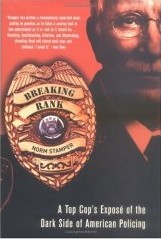DRCNet
Book
Review:
"Breaking
Rank:
A
Top
Cop's
Expose
of
the
Dark
Side
of
American
Policing,"
by
Norm
Stamper
(2005,
Nation
Books,
396
pp,
$26.00
HB)
7/29/05
Norm Stamper is probably best known as the police chief who lost his job in the wake of the 2000 "Battle in Seattle" occasioned by mass anti-globalization protests designed to shut down the World Trade Organization meeting there. Stamper's Seattle police, charged with protecting the proceedings and confronted by massive demonstrations spiked with occasional bouts of property damage by young anarchist cadres, went on a rampage of their own, violently assaulting nonviolent demonstrators and -- perhaps more crassly in the eyes of Seattle residents -- indiscriminately tear-gassing the innocent denizens of the city's tony Capitol Hill district. Stamper's performance then is certainly open to criticism, and his relatively sketchy account of that event in this volume won't quiet critics, but to remember Stamper solely for that brouhaha is to do an injustice to a man whose career has been a model of progressive policing.
While a healthy skepticism toward law enforcement is desirable, some of us need the occasional reminder that not all cops are thuggish Neanderthals. Stamper helps immensely. Working his way up through the ranks from a San Diego beat cop, he describes the sick pleasure he took in roughing up miscreants, but he also describes the epiphany he had at the hands of a scathing DA. As a progressive police executive, he examines sexism and sexual harassment within police departments, but doesn't flinch from addressing issues such as whether women cops have sufficient upper body strength to do the job. His accounts of police killings and of police killed reveal a thoughtful law enforcement executive grappling with the most fundamental issues and gives pause to those who are quick to shout "murder" every time a police officer guns down a suspect. In a breathtakingly brutal and personal opening chapter, Stamper takes on domestic violence. The chapter is written in the form of an open letter to former Tacoma Police Chief David Brame, who shot and killed his wife in the ultimate act of domestic abuse, then turned his gun on himself. Stamper harshly berates the now-departed Brame as a "coward," even as he unflinchingly describes his own beatings at the hands of his father and his own resort to physical violence at home as an adult. But unlike Brame, Stamper recognized his inner demons and dealt with them. For anyone who has been affected by domestic violence -- and even those for whom it is no more than a theoretical problem -- Stamper's chapter is a call to arms. For Stamper, the drug war is a failure, plan and simple, and the answer is what he calls "decriminalization," but what most of us would recognize as regulated legalization. The drug war is bad for police as an institution because it breeds corruption and distorts policing priorities, Stamper writes under the chapter heading "Wage War on Crime, Not on Drugs." It is time for police executives to speak out and end this fiasco, he says. "Right now the only people actively campaigning for sanity on the drug scene are hempheads, political mavericks, and career decriminalistas," Stamper notes. "If a small collection of thoughtful, currently closeted law enforcers were to make their views known they'd have influence far beyond their numbers." Stamper, by the way, sits on the advisory board of a group of mostly retired law enforcement officers who are doing just that, Law Enforcement Against Prohibition. While fewer than 20 of the book's nearly 400 pages deal directly with the war on drugs, it should be required reading for anyone interested in drug reform or the larger issue of the proper role of the police in our society. The drug war cuts across all sort of policing issues, from the often mindless resort to paramilitary SWAT team-style policing to debates over community policing, from dealing with street crimes and violence to setting limits on searches and surveillance. Stamper looks at all of this, examining cop culture and police politics with an informed, incisive eye and a gripping narrative style. Readers may not always agree with Stamper's conclusions, but they will be well-served indeed to read him and think hard about the issues he raises. They are issues of key importance to all of us.
|

